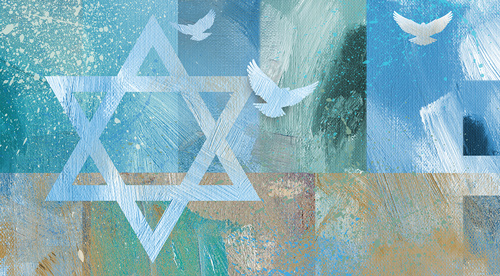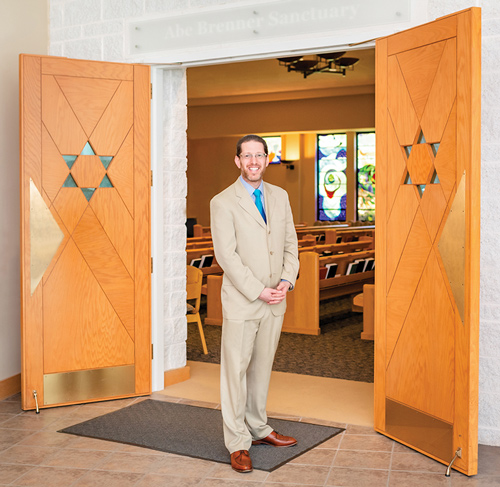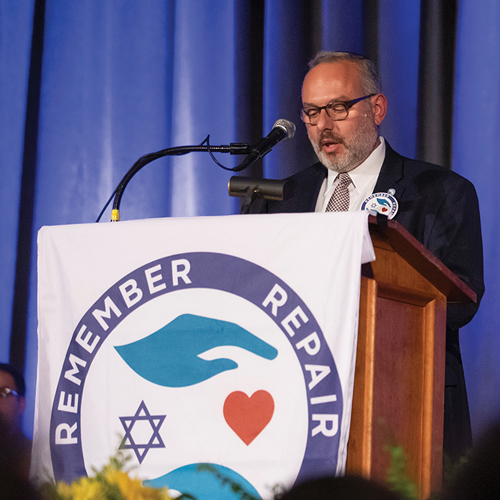How Am I Supposed to Explain This?
Unfortunately, that's a common question Jewish parents ask themselves when it comes to acts of hate. Rabbi Charlie Cytron-Walker, who was held hostage with members of his congregation in January, and other experts have some guidance.
By Sam Borden
PROOF

Artwork by iStock.com/gdarts
This story appeared in the July 2022 issue of PROOF, a PJ Library magazine.
Six months ago, Rabbi Charlie Cytron-Walker was just trying to stay alive. His synagogue had been breached. A man with a gun was shouting. Rabbi Charlie and a group of congregants were hostages.
Yet even amid the fear of the 11-hour ordeal that unfolded outside Dallas back in January, Rabbi Charlie was still able to recognize, in that moment, that however everything ended, the trauma of the situation he was living through wouldn't be limited to just the people in the room.
It couldn't. It was playing out right there on his computer screen.
“Honestly, I thought of it while it was happening,” he said recently. “All the comments and people posting — there was no doubt that what was happening to us was being felt and would be felt by so many Jews.”
In a quirk of pandemic-era worship, thousands of people began following the livestream of Congregation Beth Israel's Shabbat service on that Saturday once news broke that a gunman had entered the synagogue, delivered an antisemitic screed, and demanded the release of an Islamic extremist from a nearby prison. And after Rabbi Charlie helped defuse the situation so he and the other hostages could escape unharmed, he was able to process the meaning of the online audience. He was able to realize that in addition to being incredibly supportive, it was also an acute affirmation of a truth that he and so many Jews are feeling more and more these days: in the hyperaware, news-at-your-fingertips world of the 21st century, the trickle-down effects of antisemitism have never been stronger.
How do I tell my children about the latest terrible thing that just happened? And how do I make them aware of rising antisemitism without making them scared of being Jewish?
Now, the ramifications of that trickle-down are certainly universal. But even beyond the personal anxieties it inspires in people of all ages, there is also a very specific set of issues it presents for young Jewish families — a reality that Rabbi Charlie and others talked about in a recent PJ Library Conversations, a series of virtual discussions for donors.
Among the issues they talked about were the two questions that Jewish parents in the digital age find themselves confronting over and over: How do I tell my children about the latest terrible thing that just happened? And how do I make them aware of rising antisemitism without making them scared of being Jewish?
SO MANY SYNAGOGUES in the United States have a similar feature in 2022: police on the property. And while most congregants appreciate the commitment to tangible safety and security measures, those measures also come with a new set of concerns for parents. The presence of police and openness about escape plans or active-shooter responses may reduce worries about physical harm, but there is a psychological cost, especially in children, that comes with it.

This summer Rabbi Charlie Cytron-Walker will become rabbi of Temple Emanuel (pictured here) in North Carolina.
Courtesy photo
Will seeing officers with guns outside their synagogue change the way kids feel about being Jewish? Will it make them think their religion is unsafe? Or dangerous? And what about when they hear about how someone was harmed because they wore a yarmulke or kept kosher or lit candles?
“Antisemitism is a defining experience,” said Ilana Garber, who spent 15 years as the assistant rabbi at Beth El Temple in West Hartford, Connecticut, and now is the director of global rabbinic development at the Rabbinical Assembly. She also has two boys.
“The question parents have to answer is, What else is defining?” she continued. “How big or how small do we make that particular piece?”
It is easy, Garber added, to come at Jewish identity from a place of caution or fear or guilt. So many Generation X and Generation Y Jews in the United States, in particular, were raised in homes where that type of attitude proliferated. A focus on the negative history — or the possibility that such negative history might repeat itself — framed being Jewish in a light that was more about victimhood than celebration or even faith.
For many parents of young children now, though, that isn't the headspace in which they want their children to live. And so there are questions about how, exactly, to position Judaism in the context of something brighter. Something more enriching. Something that flows from a place of warmth as opposed to a history of persecution or pain, even while acknowledging there will continue to be excruciating moments. As Garber said, “I don't believe in a Judaism that comes out of the Holocaust just like I don't believe in an America that comes out of 9/11.”
Rabbi Charlie feels the same. He understands the place parents are coming from when they say they are troubled about raising their children in a world of rising antisemitism.
When there's a strong identity, it makes it much, much easier to cope. So the question for parents is, What are we doing to give our kids that foundation of identity?
But the best thing those parents can do, he said, is to revise the question. “I think parents are always going to have to talk to their kids about the fact that not everyone likes them. But antisemitism is so much easier to deal with when there's a strong sense of self. When there's a strong identity, it makes it much, much easier to cope,” Rabbi Charlie said. “So the question for parents is, What are we doing to give our kids that foundation of identity?”
NOT SURPRISINGLY, the antisemitic incidents that get the most attention in the United States are the most violent ones, the ones where people (and synagogues) are under direct physical attack. This isn't unusual; violence is often the focus of the news media.
But the truth is, the vast majority of Jews will never be involved in anything quite so harrowing. They'll likely never even be close to something like that. Because, for most people most of the time, antisemitic incidents are far more subtle. More personal. More emotional.
Rabbi Charlie recalled an incident in Texas where middle schoolers took cans of Axe body spray, spritzed them in the air toward a Jewish classmate, and shouted, “Let's gas the Jew!” Garber remembered an episode at a local high school where a student found a swastika made from classroom materials on her desk. These kinds of aggressions are everywhere.
The scars for those incidents are internal but linger all the same. And that is why building a foundation of Jewish pride is so critical for kids, Rabbi Charlie said. Making Shabbat a part of the family's weekly routine — and lighting the candles even if guests are visiting — can be a critical brick in that build. Celebrating holidays or going to community events or making matzah balls do the same. “This is how we do the mitzvah of teaching our children,” he said.
But parents should know that not all the construction is so direct. Reaching children on their own terms is valuable too. During the PJ Library Conversations discussion, Rabbi Charlie was joined by Jeff Finkelstein, president and CEO of the Jewish Federation of Greater Pittsburgh, and Catriella Freedman, PJ Library's director of author and illustrator stewardship.
Freedman was emphatic in highlighting the value that stories can have in helping children feel proud of their religion. “We've really made an effort at PJ Library to make sure that kids are seeing themselves,” she said, “no matter what background and culture and Jewish community they're coming from.”
In a separate interview, Freedman said it doesn't matter whether the subject matter is specifically Jewish. The key is that the child makes a connection between what they're reading and themselves; once that happens, the sentiment behind the text will stick.
“As kids get older, books become a way for them to role-play,” she said. “They identify with protagonists; they identify with characters. It becomes a natural outgrowth.
“Essentially, PJ Library's impact goes beyond the physical pages of a book. It's really about building positive identity. By giving families the tools to celebrate Jewish life and access Jewish community, we are also giving them paths for approaching crisis. When people feel comfortable and feel like they have a sense of joy that comes with Jewish identity, then when something difficult happens, they feel like they have a way to respond.”
One PJ Library book that Rabbi Charlie always thinks about fondly is The Only One Club, a story about a girl who is the only Jew in her first-grade class. Rabbi Charlie grew up in Lansing, Michigan, where he was “the only Jew in my school other than my siblings,” so the book resonated with his personal history. Learning to be comfortable in those kinds of situations takes work, he said, and similar circumstances are common for kids growing up outside of traditionally Jewish-heavy population areas. “Especially in smaller areas, it's really important to have that sense of Jewish identity because when you have that sense of self it makes the idea of dealing with the difficulties easier,” Rabbi Charlie said. “We know bad things are going to happen at some point in life. So it's about building up that ability to deal with it.”
IN THE DAYS AND WEEKS after the 2018 tragedy at the Tree of Life Congregation in Pittsburgh, where 11 people were killed, Finkelstein was surrounded by grief. He went to funerals. He went to shivas. He checked in on survivors and their family members. It was, as he said, simply brutal.
But one of the things that makes Finkelstein proud when he thinks about that time is what happened on Monday, two days after the attack. “We were really focusing on showing resilience in the community — we wanted Jews showing up for Jewish life. We didn't want Jews to be scared,” he said. “And on Monday morning, the JCC preschool — just a few blocks away — was full. All but one family showed up that morning, even though the FBI was working out of that building. It didn't matter. They were part of the community, and they were going to go to school.”
That togetherness, obviously, is especially meaningful in the aftermath of a traumatic event, when people are desperate for the support that can only come with shared emotion. But for young Jews, a feeling of community is imperative, too, in everyday life. Children want to belong, want to fit in, want to feel like they are a part of a bigger entity than just themselves.
Creating and nurturing a Jewish identity, then, must also include the development of an attachment to something larger. “So much of our identity comes from the community around us,” Garber said. “As adults, we know that, right? And kids are the same way. It doesn't have to be dramatic. Knowing that someone else is reading those books that they're reading or going to the same events they're going to — that makes a huge difference. Even if it's just one or two other people, it matters.”
Engaging with the Jewish community is a choice that almost always falls on the parents. And the larger point Garber made is that while it absolutely matters if one is active in the community after a tragedy or other dramatic event, the work of growing a budding Jewish identity in your child almost surely comes through something more mundane, “something regular.”
Yes, of course, lean on the community when emotion demands it, she said. But the week-to-week routine, the monthly gatherings, the consistent interactions that feel like they're just part of life are the ones that will resonate. Those are the ones that will serve a child best if and when being Jewish doesn't feel so easy.
Rabbi Charlie shares that sentiment. “That is what it means to live our values. Living our values is one of the most important things we can do. If we value Jewish community, then we have to make it part of our life,” he said.
If parents do that, he continued, it will seep down. It will be accepted by their kids. It will make a difference in how they feel about themselves and their religion. It will matter.
Parents can't control who says something rude or hateful. And they can't control who wants to hurt someone or scare someone.
What they can control is what they feel pride in. And how they model a commitment to being a meaningful companion.

As the president and CEO of the Jewish Federation of Greater Pittsburgh, Jeff Finkelstein played a large role in comforting the community after the Tree of Life tragedy in 2018.
Photo by Joshua Franzos
When asked what he would say to a child who wanted to understand antisemitism, Rabbi Charlie paused for a moment.
“I would say to that child that unfortunately there are people who don't like other people for lots of different reasons,” he said finally. “And that I can't answer why that is.”
He smiled. “But I can tell you that because that does happen, that's why we need a really wonderful and diverse group of people who love us and support us. That's why we need to be proud of who we are.”
Sam Borden is an award-winning senior writer for ESPN and a former reporter at The New York Times. He's also a PJ Library dad of two girls, Riley and Hannah.
For more insight from Rabbi Charlie and the other panelists, watch PJ Conversations: Inspiring Our Jewish Future in the Climate of Antisemitism on pjlibrary.org/ourjewishfuture.